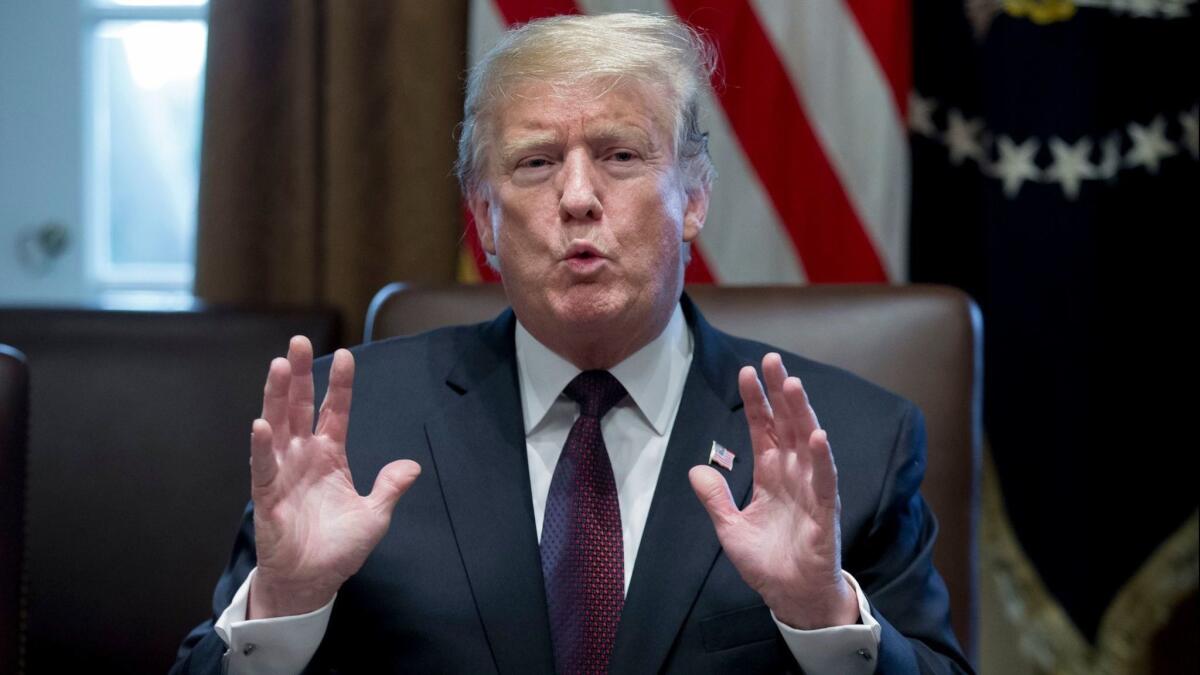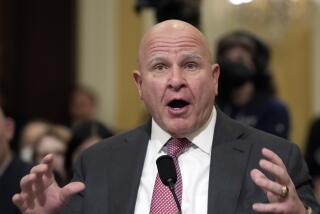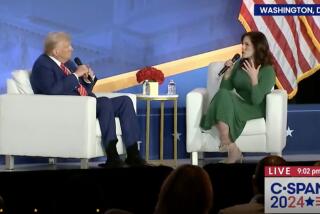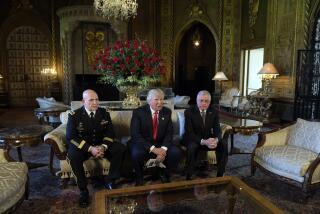Editorial: Maybe, just maybe, it’s Trump and not his advisors who needs to go ‘back to school’

Donald Trump is notorious for throwing Twitter tantrums in which he criticizes his own appointees; remember his juvenile attacks on former Atty. Gen. Jeff Sessions? Trump did it again Wednesday when he accused his top intelligence officials of being naive about Iran and suggested that they go “back to school.”
But this latest taunt was worse than just another display of disloyalty or violation of decorum. It was proof — further proof — that this president is uninterested in information that might challenge his often fallacious preconceptions about the world. That augurs ominously for the future conduct of American foreign policy, which already has been thrown into confusion by several ill-considered actions by the president, the most recent being his impulsive announcement that he was withdrawing 2,000 troops from Syria.
On Tuesday, Director of National Intelligence Dan Coats, CIA Director Gina Haspel and FBI Director Christopher A. Wray — all Trump appointees — were among officials who testified before the Senate Intelligence Committee about their recently released “Worldwide Threat Assessment.” On several subjects, the intelligence officials’ assessments departed from Trump’s talking points.
This latest taunt was worse than just another display of disloyalty or violation of decorum.
For example, Coats testified that Iran “is not currently undertaking the key nuclear weapons development activities we judge necessary to produce a nuclear device” and that it continues to implement the 2015 international agreement from which Trump withdrew the United States in May 2018. (Trump had called the agreement “the worst deal ever negotiated.”)
Coats did fault Iran for engaging in cyber-espionage, violating its obligations under the Chemical Weapons Convention and building ballistic missiles that “continue to pose a threat to countries across the Middle East.” But that criticism didn’t placate Trump, who railed against the intelligence community on Twitter for being “extremely passive and naive when it comes to the dangers of Iran. They are wrong!”
Iran wasn’t the only subject on which the intelligence chiefs were at odds with Trump’s view of the world. The president has touted the success of his nuclear diplomacy with North Korea’s Kim Jong Un, with whom he is scheduled to meet for a second time next month. But Coats said the intelligence community continues to believe that “North Korea is unlikely to give up all of its nuclear weapons and production capabilities, even as it seeks to negotiate partial denuclearization steps to obtain key U.S. and international concessions.”
Finally, Coats’ report predicted that “Russia’s social media efforts will continue to focus on aggravating social and racial tensions, undermining trust in authorities, and criticizing perceived anti-Russia politicians,” while seeking new and more targeted ways to influence U.S. policy and elections.
Trump, of course, has struggled to accept the intelligence community’s finding that Russia tried to influence the 2016 presidential election on his behalf. At a summit with Russian President Vladimir Putin in Helsinki in July, Trump famously said: “My people came to me, Dan Coats came to me and some others and said they think it’s Russia. I have President Putin. He just said it’s not Russia. I will say this. I don’t see any reason why it would be.” (Later, in response to criticism, he clarified that he had meant to say: “‘I don’t see any reason why it wouldn’t be Russia.”)
Although other administration officials, including Vice President Mike Pence, have been harshly critical of Russia, the president has been oddly loath to fault Putin. One plausible explanation is that Trump believes that to criticize Russia, especially in connection with election interference, is to undermine the validity of his own victory.
Enter the Fray: First takes on the news of the minute »
So the real problem isn’t that Trump belittles his own intelligence officials, though such behavior is petty and unpresidential. The more serious issue is that the president, for reasons rooted in egotism, seems unwilling to listen to information that might require him to confess error or reconsider a previous opinion. At some point that refusal to face reality might translate into dangerous action — or inaction.
Intelligence agencies don’t always get it right. Their fallibility was tragically made clear when it emerged that the U.S. went to war in Iraq based partly on flawed intelligence about whether Saddam Hussein possessed weapons of mass destruction (an example Trump himself has cited).
But just as a president shouldn’t uncritically accept the conclusions of the intelligence community, neither should he reject them just because acknowledging the truth might bruise his ego or force him to rethink his preconceptions. Maybe it’s the president and not his advisors who needs to go back to school.
Follow the Opinion section on Twitter @latimesopinionand Facebook
More to Read
A cure for the common opinion
Get thought-provoking perspectives with our weekly newsletter.
You may occasionally receive promotional content from the Los Angeles Times.










